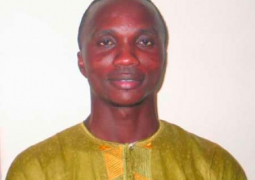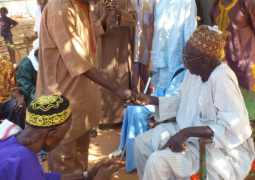The meeting aimed at establishing the culture of safety and resilience at community levels through use of knowledge and innovation.
The programme is targeting 15 communities within North Bank Region, to enhance community resilience on building vulnerability assessment, and hazards, as well as social and vulnerability maps on disasters.
The community outreach programme is out to empower people in the aforesaid settlements on how to identify hazards that pose threat to human lives, livelihood and the environment.
The main hazards identified in Barra include sea erosion, waste, flash floods, disease outbreak, domestic fire and windstorm.
The one-day forum was held in Barra Lower Nuimi in the North Bank Region.
In his welcoming address, Barra Alkalo Alh. Babucarr Faye thanked NDMA for the foresight and support in empowering people on identification of hazards and finding solution to disasters.
Building the capacities of communities is crucial to enhancing community resilience on disasters, he said.
He expressed concern on the devastating effects of hazards in his community.
The alkalo calls on the authorities and humanitarian team to safeguard the landscape from being washed away.
He used the moment to launch an appeal for upgrading Barra car park toilet facility as well as maintain proper drainage system that meets public health standard and hygiene.
He said there is need for proper cleansing of gutters and drainage facilities to allow free flow of water.
Hudul En Colley, disaster coordinator for Banjul, on behalf of NDMA, noted that “the exercise is very important to both the NDMA and the UNDP, noting that it would contribute to mitigating all forms of hazards to improve lives and livelihood.
He thanked the Barra community for their support and cooperation on the identification endeavour and also on mapping out community resources of mitigating and prevention of disasters.
Momodou B.K. Ceesay, Regional Disaster management coordinator for NBR, reiterated the roles of the community in establishing the culture of safety and resilience at all levels through use of knowledge and innovation.
He said disaster prevention and mitigation calls for concerted efforts of all stakeholders.
The NBR disaster coordinator called on the people to be proactive in taking ownership in disaster management.
He called for more social mobilization to carry out periodic cleansing of gutters and ensure proper management of waste.
Bibhuti Bhusan Gadanayak, UNDP Disaster Risk Reduction & Climate Change Adaptation Specialist at the NDMA/UNDP, said the synergy would gather accurate information on community hazards of averting all forms of disaster.
He noted that the involvement of village disaster management committee is vital in the development of town or village plan to mitigate the effects of vulnerability.
He said resource and hazard mapping would contribute to providing humanitarian relief to the affected population, through the use of local resources, to enhance response.
People need to know the linkages between resources and vulnerability and strengthen the response mechanism as well as enhance community participation and preparedness initiatives.
He applauded the cordial relationship that exists between the UNDP and the NDMA in the transfer of technical input to enhance humanitarian work and response.
Bala Touray, Officer Commanding Barra Fire and Rescue Services, used the moment to remind people to be more vigilant on the management of domestic fire.
Commenting on handling of domestic fire, he noted that people should hire the services of qualified electricians to carry out proper wiring of houses to avoid loss of lives and properties.
Mr Touray called for proper handling of gas bottles and fumigation to avoid outbreak of domestic fire.



